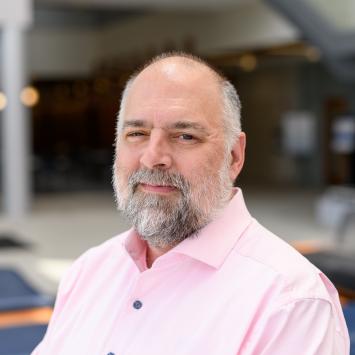Kip Guy
Dean, College of Pharmacy
Dr. R. Kip Guy (he/him) earned his BA in chemistry from Reed College in Portland, OR in 1990. After college, he worked as a process development chemist in the Process Translation Unit at IBM-Almaden in San Jose, CA. In 1996, he earned his PhD in Organic Chemistry based on the total synthesis of taxol from the Scripps Research Institute (TSRI) La Jolla, CA. He also carried out additional training in Physiology at the Woods Hole Research Institute in Woods Hole, MA in 1995.
Dr. Guy serves as a DEI Executive Sponsor for the Community Outreach Workstream.
From 1996 to 1998, he was a Helen Hay Whitney Postdoctoral Fellow in Cellular Biology focusing on the relationship between hedgehog signaling and sterol homeostasis with Drs. Brown and Goldstein at University of Texas Southwestern Medical Center, Dallas, TX. In 1998 he joined UCSF as an Assistant Professor with joint appointments in Pharmaceutical Chemistry and Cellular and Molecular Pharmacology. In 2002 he founded the Center for Chemical Diversity at UCSF, which provided access to high throughput chemistry to the campus. In 2003 he founded the Bay Area Screening Center, a joint endeavor between UCSF and the Gallo Institute that provided high throughput screening. These were subsequently merged into the Small Molecule Discovery Center. In 2005, he was promoted directly to Full Professor.
In 2005 he was recruited to St Jude Children’s Research Hospital, Memphis, TN, to found and chair the new department of Chemical Biology and Therapeutics where he was the Robert J. Ulrich Chair in Chemical Biology and Therapeutics. His research is focused on the discovery and development of novel small molecules that target the pathophysiology of orphan diseases, particularly pediatric oncology and protozoal infectious diseases. Most of his group’s work falls into the areas of chemical validation of novel targets, lead discovery and optimization of novel chemical matter for validated disease targets, and use of non-targeted whole-cell strategies for lead discovery and optimization.
